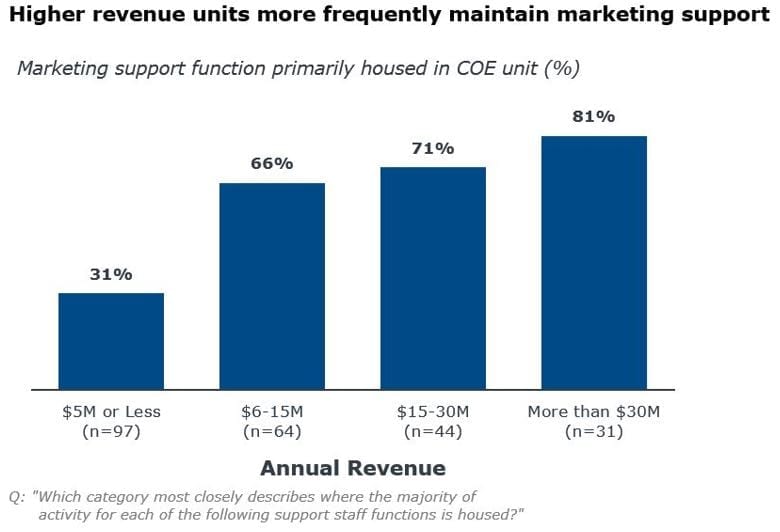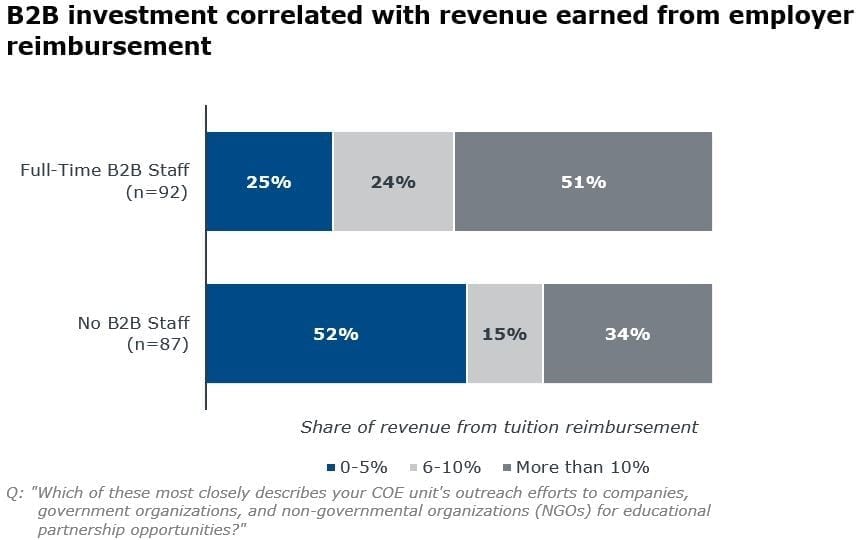Here’s how successful COE units generate more revenue
Over the past six years, the Professional & Adult Education Forum has benchmarked the organizational characteristics of professional, continuing, and online education divisions. We’ve created a dataset that includes over 230 institutions to gain insight into how COE unit organizational design can promote (or inhibit) revenue growth.
We commonly hear questions from our members about whether their COE units are properly staffed or if they are dedicating staff time to the support functions most critical to their unit’s success. While every team’s needs differ, the data from our Organizational Benchmarking Initiative begins to provide some of those insights about where to invest in staffing and why.
This resource is part of the Strategically Staff Your Adult and Professional Education Unit Roadmap. Access the Roadmap for stepwise guidance with additional tools and research.
Prioritize staff functions most critical to success, such as marketing
Our research found an unsurprising correlation between staff size and revenue outcomes, indicating that larger staffs are often able to support more ambitious growth goals. While some units maintain well over 100 full-time employees, the majority of COE units maintain 50 or fewer full-time employees, excluding faculty and instructors to support academic programming and support services.
While more staff allows COE units to pursue more ambitious goals, the key to next-level growth is devoting staff to functions that most closely connect to unit’s success.
Maintaining marketing staff focused specifically on adult and online offerings is highly correlated with revenue growth. At the highest revenue bands, units also tend to maintain control over other functions, such as financial aid and IT support.
COE units that maintain marketing support functions can optimize their marketing approach to pursue non-traditional students, but at a higher cost to the unit itself. Yet most members say taking on the cost of marketing themselves is often well worth the investment.

Invest in B2B staff for more productive partnerships
COE units with dedicated staff focused on corporate relationships generate more revenue from tuition reimbursement arrangements and contract education opportunities with local business and governments. Since partnerships are largely reliant on developing relationships with key contacts, it’s no surprise that institutions who invest in B2B staff typically earn more revenue from both tuition reimbursement and contract education.

Sixty-two percent of COE units actively manage outreach efforts to companies, government organizations, and NGOs for partnership opportunities, though the extent of this outreach varies considerably by institution. Some COE units invest in staff specifically dedicated to managing these relationships, while others include this responsibility within other staff roles until they have the funds necessary to support an FTE.
Access our full benchmarking resource center to answer your pressing questions
Access our new Organizational Benchmarking Resource Center for resources on other topics including program approval speed, faculty compensation, and portfolio diversity. Use the resource center for guidance, benchmarking data for your institutional segment, and more information on receiving a customized organizational analysis.